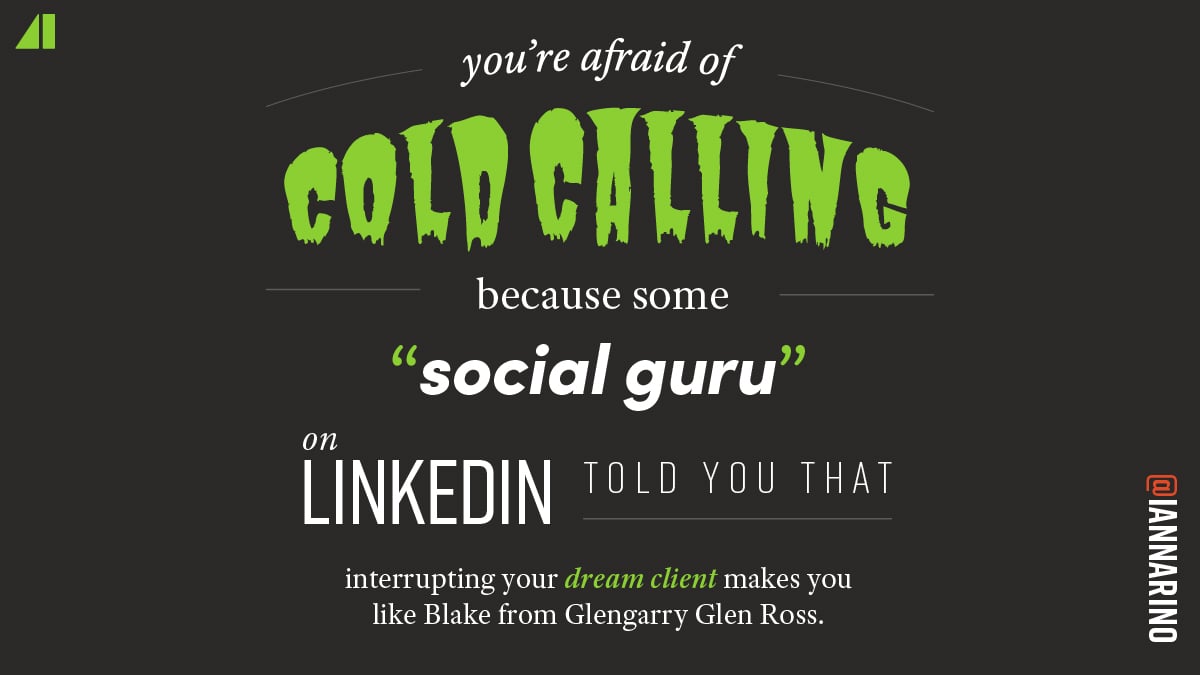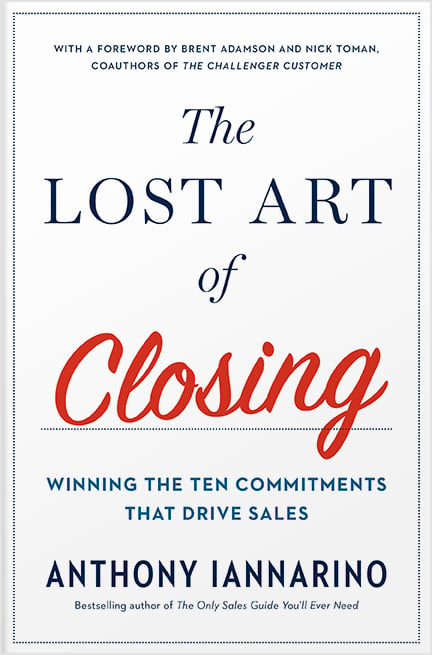The Gist:
- The obstacles that create a fear of the phone fall into three categories: the environment, character traits, and leadership.
- Removing your salespeople’s fear of the phone means dealing directly with the factors that prevent them from confidently calling their prospects.
- The more time you spend improving the effectiveness of the call, the less there is to fear.
There are a number of reasons a salesperson may be afraid to pick up the phone and call their prospective clients to proactively help them with the better results they can provide. Some of these factors are environmental, others reflect character traits, and a few of them trace back to leadership.


Environmental Factors That Kill Calls
Certain environmental factors discourage salespeople from using the phone to reach out to their clients. These factors are ubiquitous on the professional social media site, LinkedIn, but you also find them emanating from Silicon Valley.
The Anti-Cold-Call Charlatans
On any given day, you will find at least a dozen charlatans insisting that no salesperson should ever pick up the phone and interrupt a client’s day. They act like a cold call is a felony, as if the client will be somehow irreparably harmed by answering a sales call.
These “experts” are neither salespeople nor sales leaders. They are essentially marketers. But more importantly, they’re just fishing, trying to get other people hooked on the idea that content marketing or “social selling” is a better approach.
You should never allow hunters to take advice from fishermen: no one ever bagged a duck (or even a wascally wabbit) by just staring at the woods and waiting for the animals to find them.
The Valley Girls (and Boys)
There are enormous risks to the Silicon Valley ethos, one that suggests that “efficiency” is more important than “effectiveness.” It’s built on the idea that one should automate prospecting, using a brute force approach to pummel the prospect into responding to an email. The goal is to capture your client’s money while you sleep.
There is a lot for marketers to love about this approach. First, they get to control the message being sent to their prospective clients, which explains why so many of these emails speak to “why us” and not “why change.” Marketers are not salespeople. They prefer the safety and security of being far away from a prospective client, speaking to them as a collective instead of dealing with them or their problems individually.
The idea that email is an effective choice for prospecting has taken hold, convincing salespeople to start every conversation in a medium that invites an easy “no thank you” or a tap of the delete button. One salesperson told me they send eight emails over eight weeks before calling a client. That’s just a waste of eight weeks, since time is far more important than “efficiency.”


Character Traits
There are also a couple character traits that cause people to resist making phone calls: conflict aversion and a lack of confidence. It can take time and effort to help a salesperson improve in these two areas, both of which are necessary to getting meetings using the telephone.
Conflict Aversion
Some people struggle with conflict, even necessary or productive conflict. They worry that the person answering the phone is going to be mad at them, perhaps because they were in the middle of spamming all their LinkedIn contacts. The fear of conflict prevents the individual from dialing a number and asking for a meeting, even though there is no possibility of their being harmed.
Dealing with conflict seems to remedy this fear more than anything else, but a good start is ensuring that you have good language to handle even the grumpiest of contacts.
Lack of Self-Confidence
A lack of self-confidence is not the same as being conflict-averse. It’s a lack of belief in yourself, something that is generally detrimental to success in any arena. In the worst cases, the salesperson doesn’t recognize their self-worth, creating an obstacle to creating value for their clients.
Improving self-confidence requires helping build the individual up by recognizing their strengths and their value, and then convincing them to recognize (and appreciate) it themselves.


How Leaders Prevent Cold Calls
Some of the blame for making too few calls must be laid directly at the feet of sales leaders. There are things leaders do that reduce the number of calls their sales team makes.
Counting Only Dials
The lead who only counts dials is one who believes that activity is the only thing worth measuring. Lots of bad activity is not better than a little effective activity. When a leader is unable to help improve the quality of their team’s calls, they slam their hand on the “more” button, as if activity can improve an effectiveness problem.
Treating dials as if they count for more than scheduled meetings with prospective clients removes the purpose and meaning from cold outreach. The purpose of your calls is to proactively help your prospective clients improve their results before they are harmed.
No Hunter Culture
Leaders who mainly care about winning deals have a blind spot when it comes to “opportunity creation.” They look only at deals, ignoring the few things that allow one to create a new opportunity.
A hunter culture celebrates the creation of new opportunities as well as winning the eventual new client. When opportunity creation isn’t valued, you will see salespeople with far fewer calls compared to colleagues in a hunter culture.
No Scripts or Language
Leaders often assume that the salespeople they hire know how to sell, that they have been trained, and they don’t need any real direction on how to effectively prospect. Most salespeople, however, have received little to no training, and those that have probably learned outdated or legacy sales approaches.
You can improve both the number and quality of your team’s calls by them with effective and confidence-building language, giving them a sense of control of the call and a higher probability of scheduling a meeting or becoming known to their contact in some positive way. To do that, give them the tools they need to be successful in their role, including scripts, language choices, and strategies for creating events on their prospect’s calendar.
Lack of Value to Trade
There is no value for a client in a sales meeting where the salesperson tells them all about their company, all about their solutions, and then asks what is keeping them up at night. Like many legacy approaches, this one has lost its effectiveness over time.
It is easier and more enjoyable to make calls when you are confident that what you are offering in trade for your client’s time is going to be incredibly valuable for them—even if they don’t buy from you in the next fourteen minutes. By providing salespeople with real value to trade, you improve your overall results, and you serve your clients better than competitors who believe that a call is made only to qualify a prospective client.
No Rehearsal
Ah, the dreaded roleplay. There is no reason not to be prepared for the everyday conversations you have in sales, starting with the first time your prospective client hears your voice. Rehearsing the calls you make improves your competence and your confidence.
Role-playing not only improves the number and quality of calls, but it also allows salespeople to hear what others say, borrowing effective language from their peers and sharing what works for them. This improves the effectiveness of the individuals and the team overall.
Building a phone-first approach to prospecting means dealing directly with the obstacles that prevent salespeople from making their calls and providing them the tools necessary to succeed in acquiring meetings with decision-makers and decision-shapers.
Do Good Work:
- Explore the factors that you believe cause a fear of the phone.
- Find and implement structures that eliminate fear, starting with the section on leadership.
- Create a focus on opportunity creation, making it every bit as important as winning deals.

Essential Reading!
Get my 2nd book: The Lost Art of Closing
"In The Lost Art of Closing, Anthony proves that the final commitment can actually be one of the easiest parts of the sales process—if you’ve set it up properly with other commitments that have to happen long before the close. The key is to lead customers through a series of necessary steps designed to prevent a purchase stall."
Buy Now







.jpg?width=768&height=994&name=how-to-lead-ebook-v3-1-cover%20(3).jpg)


